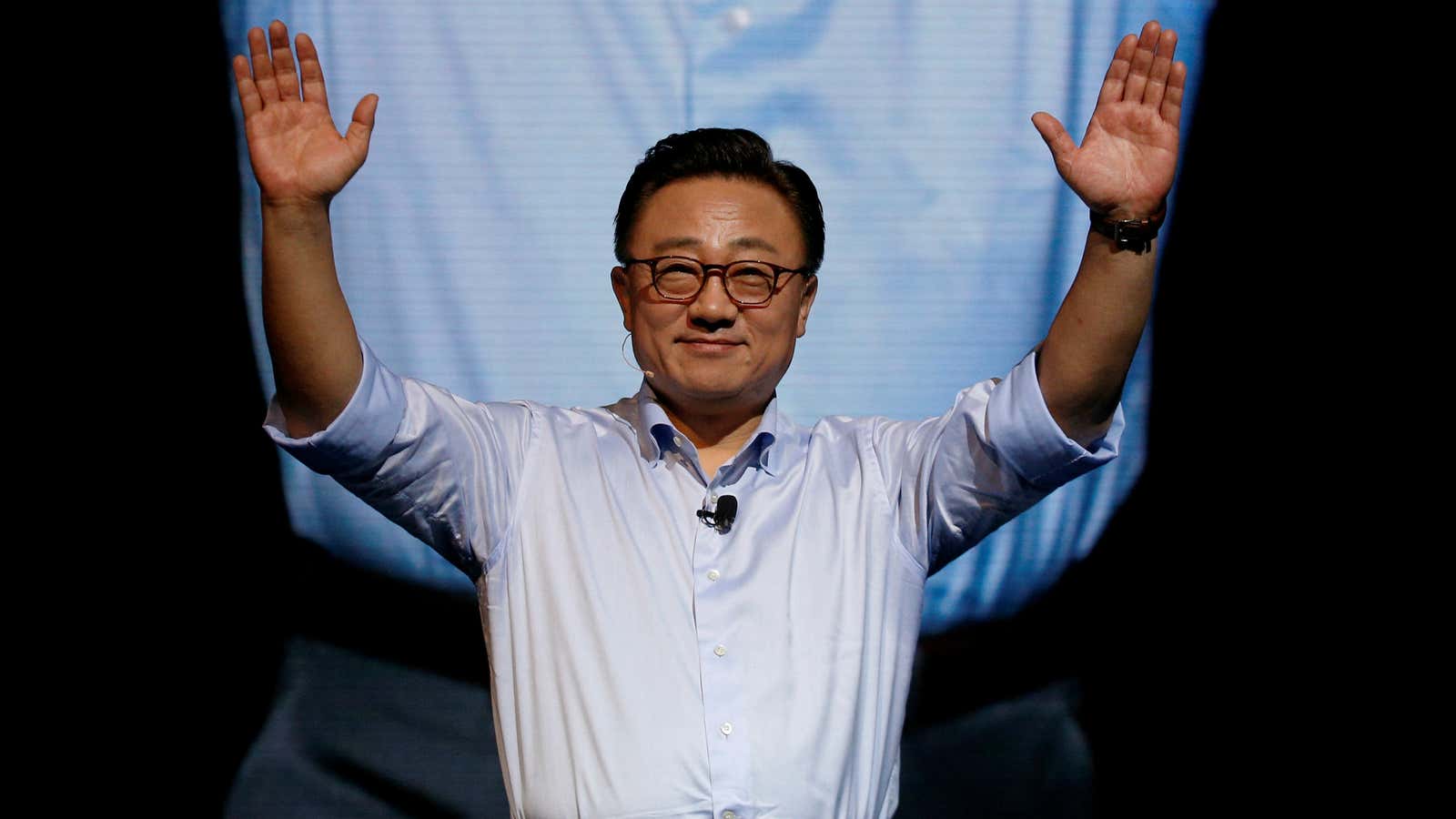Samsung Electronics has swept its leadership slate clean and appointed a group of new bosses. From the looks of it though, they’ll act a lot like the old bosses.
Hours after reporting record operating profits, the company announced a complete reshuffle of its executive team. The appointments, however, suggest that Samsung Electronics will still run much like it has in the past—and that could be either good or bad for its future.
According to Samsung, Yoon Boo-keun and Shin Jong-kyun will step down from their respective positions as co-CEOs and heads of the company’s consumer electronics division (which includes televisions and home appliances) and mobile communications division (which includes phones). In addition, Lee Sang-hoon will leave his post as CFO and become board chairman in March.
Their resignation follows that of Kwon Oh-hyun, who abruptly announced in mid-October he would depart from his post as head of Samsung Electronics’s semiconductor division, as well as his board position—which we now know will be filled by Lee Sang-hoon.
What a “new spirit and young leadership” mean
Kwon had assumed the position of Samsung Electronics’ top executive after Lee Jae-yong, the company’s third-generation heir, was sentenced to five years in prison for bribery in August (he has filed an appeal). When Kwon announced his resignation, he called for a new executive team “with a new spirit and young leadership to better respond to challenges arising from the rapidly changing IT industry.”
Kwon’s definition of “young” appears to mean men in their late 50s. Kim Ki-nam is 59, Koh Dong-jin is 56, and Kim Hyun-suk is 56. As for their respective predecessors—Kwon Oh-hyun is 65, Shin Jong-kyun is 61, and Yoon Boo-keun is 64. Lee Jae-yong, at 49, is younger than all of them.
The “new spirit” Kwon referred to, meanwhile, refers to longtime company men, who have worked at Samsung for decades. Kim Ki-nam, the new co-vice chairman, joined Samsung in 1981 and is known for helping lead its advancement in memory chips, now one of its biggest moneymakers. Koh Dong-jin joined Samsung in 1984 and became president of its phone division in 2015. Kim Hyun-suk joined Samsung in 1992.
Mark Newman, an analyst who covers Samsung at Sanford C. Bernstein, says the reshuffle was spurred in part by Samsung’s desire to show the Korean establishment it’s “cleaning up its act” after its involvement in South Korea’s corruption scandal was discovered. It also will inject younger blood into upper management—however slight actual age differences might be. But it won’t lead to a major shift in direction for Samsung.
“I don’t think much will change. It’s a very well-run company…and they’re just having a bit of an internal reshuffle, which seems probably quite healthy,” he says.
Sanjeev Rana, who tracks Samsung at CLSA, agrees that the company will continue to operate much as it always has. “It would have been a change if they had chosen someone completely unexpected from some other divisions,” he says. ”Korean corporate culture is very much hierarchical and regimented. Abilities matter, but seniority is also equally important,” he adds.
The pluses and minuses of a reshuffle
Whether Samsung requires a more radical shake-up depends on how much confidence one has in the its present system, which remains tightly controlled by company lifers loyal to the Lee family.
On the one hand, the company has collected strong profits throughout the past year from its robust components division, and today (Oct. 31) announced a dividend program for investors through 2018 and 2020. The Galaxy Note 7 fiasco, in which millions of phones with exploding batteries were shipped out to consumers, has done nothing to hinder its financial success.
On the other hand, the company remains behind in artificial intelligence compared to Google, Huawei, and Apple. Lee Jae-yong was said to be a key driver behind the company’s push in that realm, but if he ends up serving prison time, he’ll be at least partially removed from the company’s operations.
